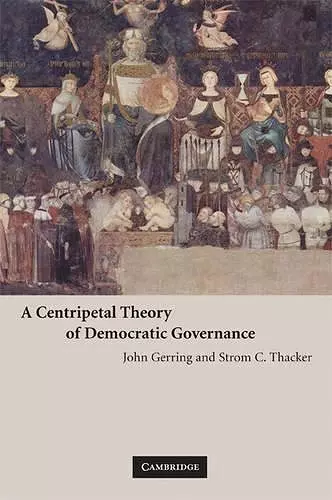A Centripetal Theory of Democratic Governance
John Gerring author Strom C Thacker author
Format:Paperback
Publisher:Cambridge University Press
Published:8th Jun '08
Currently unavailable, and unfortunately no date known when it will be back
This paperback is available in another edition too:
- Hardback£42.00(9780521883948)

This book outlines the importance of political institutions in achieving good governance within a democratic polity.
This book outlines the importance of political institutions in achieving good governance within a democratic polity and sets forth an argument for what sort of institutions do the job best, focusing on 'centripetal institutions', which maximize both representation and authority by bringing political energy and actors toward the centre of a polity.This book outlines the importance of political institutions in achieving good governance within a democratic polity and sets forth an argument to explore what sorts of institutions do the job best. By focusing on 'centripetal institutions', which maximize both representation and authority by bringing political energy and actors toward the centre of a polity, the authors set forth a relatively novel theory of democratic governance, applicable to all political settings in which multi-party competition obtains. Basing their theory on national-level political institutions, the authors argue that there are three types of political institutions that are fundamental in securing a centripetal style of democratic governance: unitary (rather than federal) sovereignty, a parliamentary (rather than presidential) executive, and a closed-list PR electoral system (rather than a single-member district or preferential-vote system).
“This is an ambitious project, which asks how the design of democratic institutions affects downstream indicators of government performance, such as corruption, quality of bureaucracy, political stability, rule of law, protection of civil liberties, the capacity to tax, the provision of infrastructure, public health, illiteracy, trade protectionism, and more. Gerring and Thacker advance the controversial argument that institutions that centralize political authority outperform those that decentralize power. Scholars of comparative politics and would-be political reformers alike should take note of this important piece of work.” -John Carey, Dartmouth College
“This splendid book offers a comprehensive theory, and a wide-ranging set of empirical tests, to explain why some democratic governments work better than others, and it represents is a significant addition to the growing body of evidence in favor or parliamentary government and proportional representation. It will be a touchstone for social scientists, policymakers, and constitution-drafters who are concerned with the role of formal institutions in structuring the tasks of governance.” -Arend Lijphart, University of California, San Diego
ISBN: 9780521710152
Dimensions: 227mm x 152mm x 15mm
Weight: 350g
248 pages